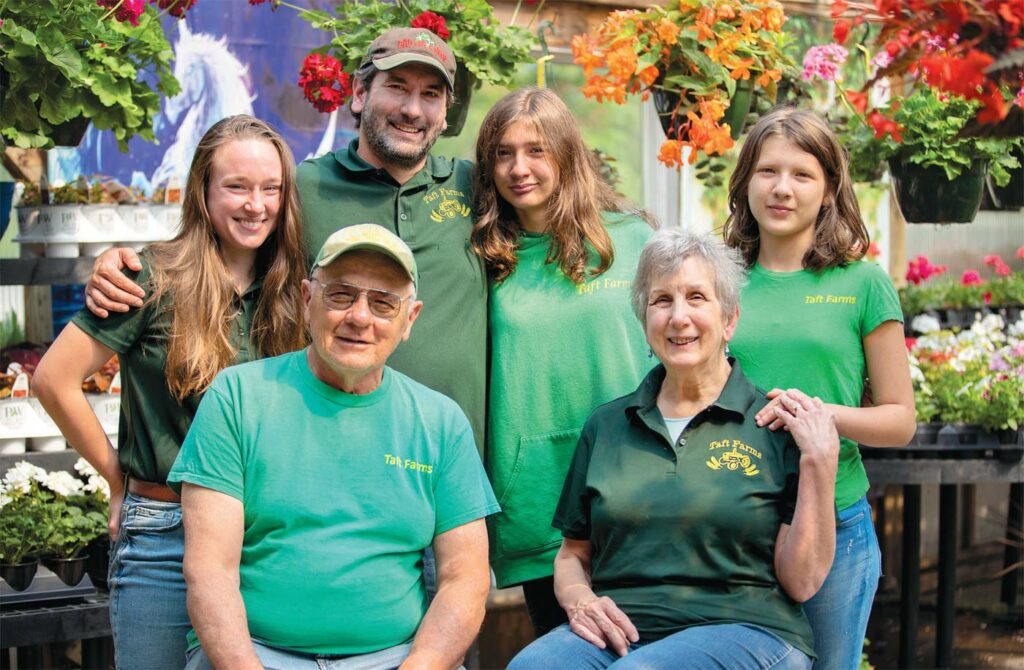
The farm was headed for disaster, and then Paul Tawczynski turned lemons into lemonade
For more than 60 years, Paul Tawczynski’s family has been farming some of the most fertile land in the Housatonic River Valley. Taft Farms’ 200 acres are partitioned by two rivers into three pastures—a geography that lends itself well to the sustainable and largely pesticide-free practices that Paul’s father, Dan, and his uncle, Stanley, embraced long before it was fashionable.
For those of us who grew up in the Berkshires, Taft Farms has been a steadfast and valued local source of fresh produce—particularly corn—for as long as I can remember. Today, it’s much more than that, and Taft caters to an increasingly diverse customer base. Most weekends, the parking lot is full and the store is loaded with local folks and weekenders alike, standing in line for overstuffed sandwiches and perusing the coolers for local yogurt, cheeses, milk, homemade soups, and fresh fruit and veggies. Flower baskets and flats of annuals and perennials in a riot of color beckon to gardeners. And at this writing, Paul had just completed a major renovation with a $300,000 food security infrastructure grant from the Massachusetts Department of Agricultural Resources. It looks to all the world like a successful business. But at the beginning of 2020, says Paul, Taft Farms was “just months away from not even existing.”
“I sold vegetables on our front lawn on a card table under a beach umbrella when I was 5 years old,” recalls Dan Tawczynski, now 78 and still a familiar presence at the farm.
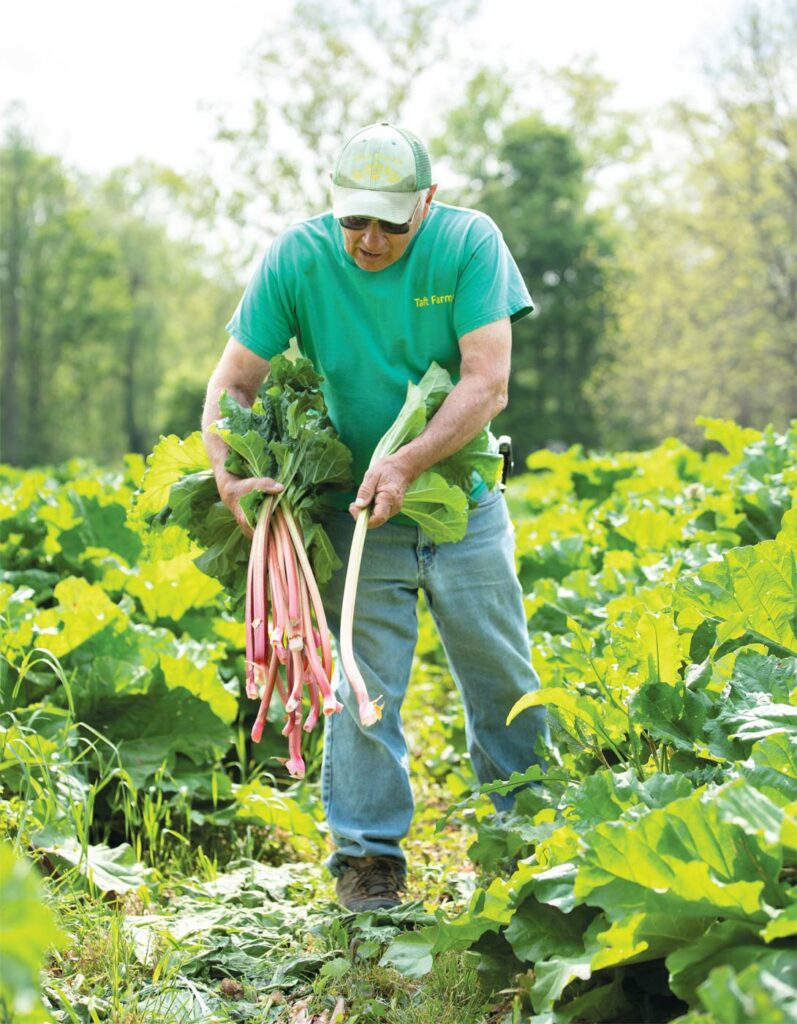
BRIDGE IS OUT
Those were grim days. The farm was suffering from the effects of some punishing growing seasons, and the labor shortage had inflicted additional stress. To make matters worse, the Division Street bridge, essential to connecting the store and its farming equipment to the fields, was deemed unsafe and was shut down in 2018. It would remain closed until a temporary bridge was erected, with great fanfare, in November 2022. But for more than three years, the quarter- mile trip from field to store turned into a nine-mile round trip slog through the Village of Housatonic for Taft’s farm vehicles, some of which were only moderately road-worthy.
“The first year they closed the bridge, we lost our shirts on that harvest,” says Paul. “Labor costs were five times what we had budgeted and, overall, revenue dropped by 70%.”
It’s hard to imagine any business surviving under those circumstances, but as it turned out, the stars aligned and Taft was able to turn lemons into lemonade. It had an unlikely benefactor: the pandemic.
Covid-19 sounded the death knell for many businesses, nationwide. Restaurants, retailers, and manufacturing companies shuttered their doors for good as customers and employees hunkered down to stay safe at home. But others will tell you—and this is frequently whispered and tinged with more than a little guilt—that the pandemic was actually good for business. So how did that work for Taft? You have to know a little more about Paul to connect those dots.
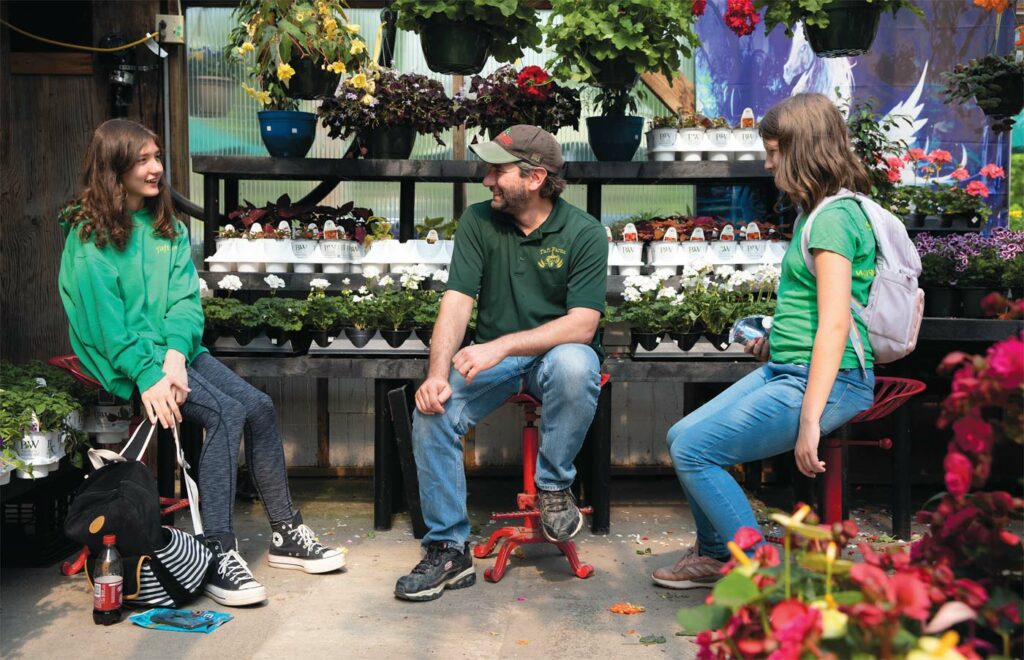
“We reinvented ourselves almost overnight. And even more importantly, we reestablished our relevance to so many people.” —Paul Tawczynski
FISH OR FARM?
The youngest of four siblings, Paul grew up on the farm, which was started by his father and uncle in 1961. The idea was simple: Farm on some of the most fertile land in the state, eschewing chemicals and pesticides as much as possible. The brothers had plenty of experience. “I sold vegetables on our front lawn on a card table under a beach umbrella when I was 5 years old,” recalls Dan, now 78 and still a familiar presence at the farm.
Taft was a roadside farmstand for years and the family worked diligently and endured plenty of hardships (fires, drought, floods, and hurricanes that washed entire pumpkin crops into the river). The all-consuming and never-ending demands of the farm were often tough on the kids. “There were times that you resent the work and not being able to play with your friends, or having a football game and your parents aren’t there because they’re harvesting potatoes,” Paul says. “You exist to take care of the farm more than the farm exists to take care of you. And you don’t realize that until you’re an adult.”
In his younger days, Paul’s own passion was on the water rather than land; he pursued a career as a professional bass fisherman right out of high school. He was successful enough to attract the attention of a lure company in Wisconsin and became their sales manager and, quite literally, the face of their product: His image was on their packaging. He was persuasive, motivated, and a natural salesman. But he was also homesick. After two years, he began to realize how deeply ingrained in him the farm was—a feeling that was compounded when, on his drive to work, he’d pass a dozen Wisconsin farms, many of them out of business or for sale. “I couldn’t imagine that happening to my family’s farm,” he says. So at age 24, he packed his bags and came back to Housatonic.
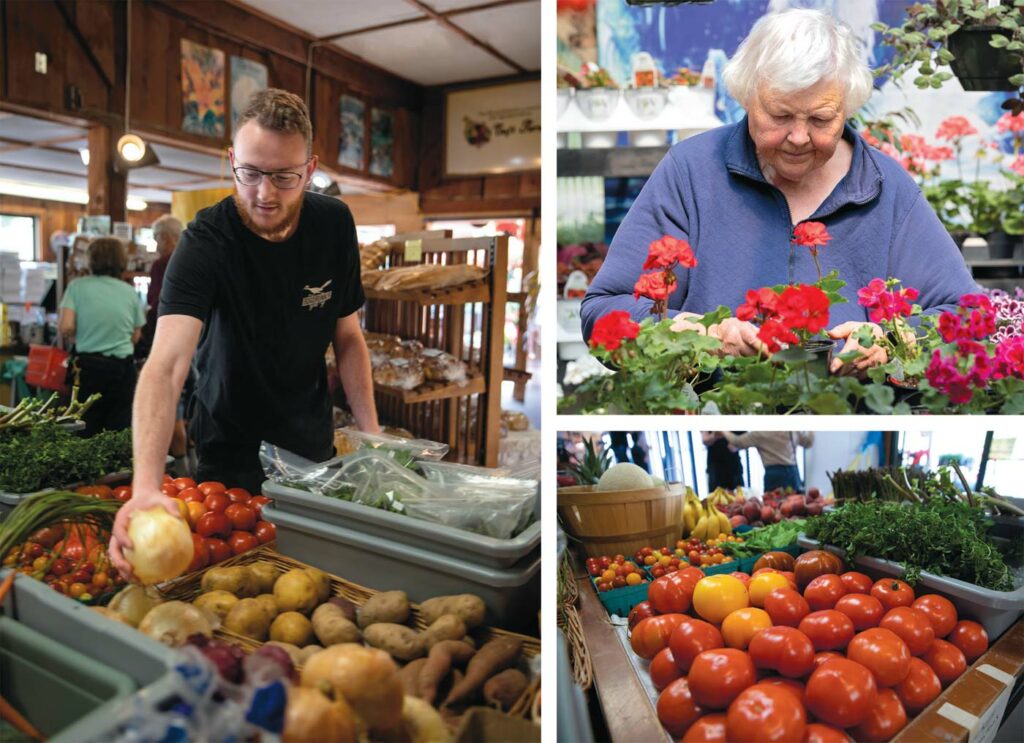
A DIFFERENT PERSPECTIVE
Going away for a bit was not a bad thing—Paul came back with a different perspective on business. For his parents, it was always “farm first,” but Paul realized that the family operation would also need to adopt a business mentality to survive. “I wanted to protect the ability to farm through business instead of having it be one disaster away from being bankrupt every year,” he says.
While the bulk of his work was in the field and in cultivating wholesale relationships, Paul delved into a different area of the business in 2008. Two employees—a chef and the deli manager—left precipitously in the middle of July, so Paul, who had always been a pretty good home chef, stepped into the kitchen. He rose to the challenge and grew Taft’s food service to become a major revenue generator, using the farm’s own vegetables and local meats from other farms to make high-quality soups, sandwiches, and other prepared foods.
“In the summer of 2018 we were making 450–500 sandwiches a day,” Paul recalls. “When the bridge went out, we dropped 70% of our food business overnight and there was nothing we could do about it.” Lunch customers who used the bridge to access Taft were not willing to drive the extra miles, and who could blame them? That winter, Paul and his family tapped every penny of their savings to keep the farm afloat. And then, a little more than a year later, the pandemic hit, and thus began Taft’s transformation. “We reinvented ourselves almost overnight,” Paul says. “And even more importantly, we reestablished our relevance to so many people.”
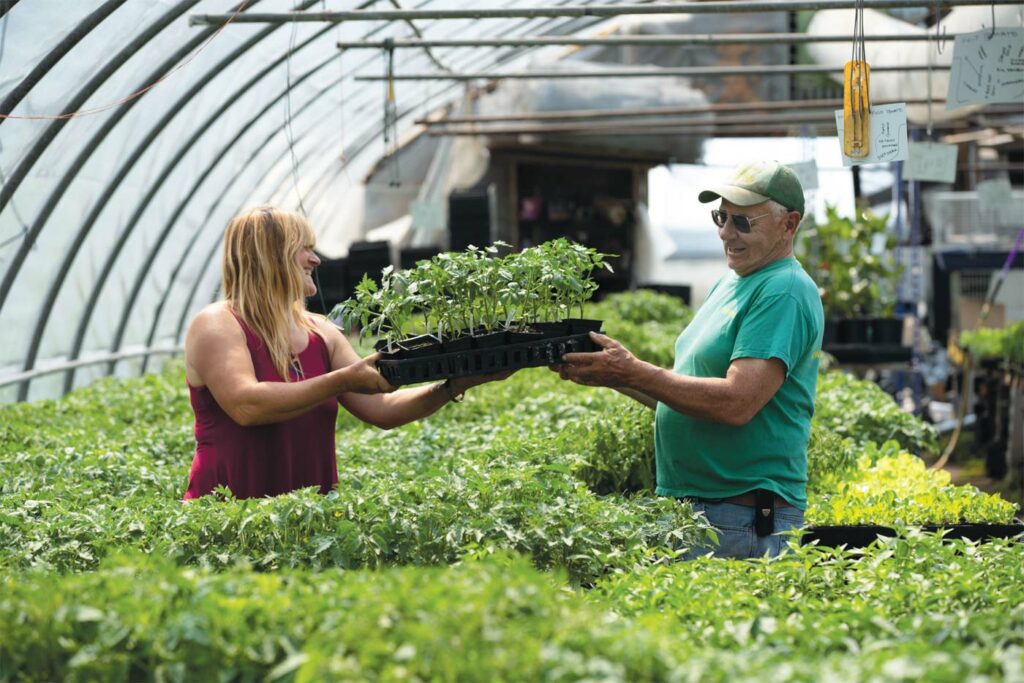
PANDEMIC REINVENTION
Taft Farms, once simply a source of fresh fruit and veggies and prepared foods, became a community resource. It began stocking aluminum foil, coffee filters, laundry detergent, and other household essentials that were suddenly out of stock at local supermarkets because of supply chain issues. And Paul found himself in an enviable position with food service vendors: Taft was big enough to be an important customer, but small enough so that it was the owner himself doing the negotiating. And so he went to big food distributors like Sysco, which had excess stock because restaurants were shutting down, and bought items such as yeast and flour at cost, then sold it to consumers at reasonable prices. At one point, he offered cases of chicken for 50 cents a pound.
Always proficient on social media, Paul took his skills to new levels during the pandemic. He eschewed traditional advertising for Facebook videos, which he produced once a week to broadcast his offerings to consumers, such as when he managed to score an entire pallet of 50-pound bags of flour. And he supported other local businesses by purchasing fullprice gift certificates from them and then raffling them through the videos. For employees, he offered pandemic pay, boosting their hourly rates by $2 to $5 just for showing up.
“It feels more like a family and a lifestyle than a job,” says Sue Hayden, Taft’s greenhouse manager. She started working at the farm when she was 15. Ten days after she gave birth to her daughter, Harley, Sue was back at work, baby in tow. “Danny let me bring her to work and everyone had a hand in raising her,” Sue says. Today, 16-year-old Harley works side-byside with her mom in the greenhouse. She also pastures her animals—two donkeys, two ponies, and a goat—at the farm. “It’s home away from home,” she says.
All of Paul’s efforts kept Taft on consumers’ radar while the world was shut down. At a time when a trip to a big grocery store seemed perilous, a quick stop at Taft for milk, eggs, and a chicken pot pie seemed relatively safe and also familial. But while the farm was becoming a bona fide business, it was still beset with one of the biggest problems Berkshire County businesses face: availability of labor.
As the chaos of 2020 abated, Taft settled into a “new normal.” Paul had begun a transformation, but he would need to take things a step further to address the labor situation. The bottom line: The more you grow, the more hands you need to plant, tend, and harvest. And so Paul decided to grow less. “I called every farmer I knew and said ‘I know you’re in the same boat. I have to specialize, so this is what I’ll grow. Let’s trade and take care of each other.” For Taft, that meant focusing on its signature crops—sweet corn, of course, plus 100 varieties of heirloom tomatoes, 10 acres of asparagus, three acres of flowers for cutting, and 40 acres of heirloom pumpkins and gourds, in addition to smaller amounts of selected other vegetables. The rest comes from 75 other farms in Berkshire County and surrounding areas.
It was not always an easy transition. Pennie Curry, Taft’s business manager, has been with the farm for 30 years and credits Danny and Martha Tawczynski for giving their son the green light to pursue his dream. “Paul didn’t always know he wanted to be part of the business,” she says. “I’m so proud to watch him develop and grow into his role. When he told me his vision, I said ‘Paul, let’s make it happen.’”
And the reinvention continues. At this writing, Taft had just completed a major renovation, increasing its refrigerated, cooler, and freezer space by 300% without increasing the footprint of the store. And shelves are stocked with an increasing variety of products, such as local meats, 200 gluten-free and vegan products, and a line of natural and organic household and personal care goods. It’s a selection that was partly informed by Paul’s social media posts that solicited ideas for products and brands. But perhaps the most significant change is that, as of the end of April, Taft began accepting SNAP (Supplemental Nutrition Assistance Program), expanding the options for shoppers who receive those benefits. “Many of our customers have been asking about SNAP for a long time,” says Paul. Under newly elected Governor Maura Healey, he was able to get approval to accept SNAP and has upgraded the farm’s point-of-sale system to facilitate taking those payments.
“We’re completely different in who we are and what we offer than we were in 2018,” says Paul. But while Taft has grown overall in the past five years, the deli business is still just 25% of what it was at its peak. Paul knows he needs to be patient: “We’re not just renovating the store—we’re renovating our image and what we stand for in the community, and that takes time.”
Taft Farms
119 Park St.
Great Barrington
413-528-1515
taftfarmsgb.com








